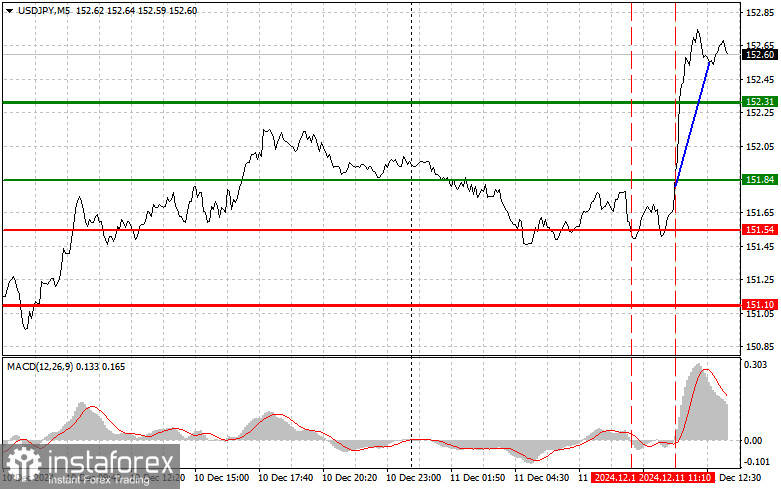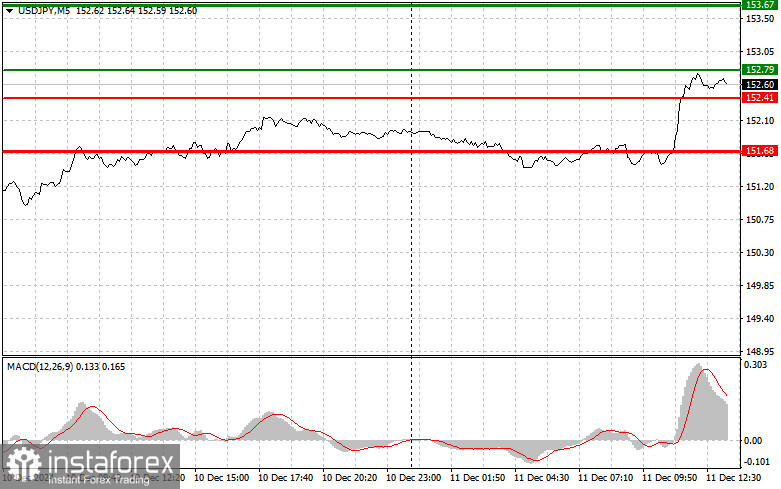Analysis of Trades and Advice on Trading the Japanese Yen
Testing the 151.54 price level coincided with the moment when the MACD indicator had just begun moving downward from the zero mark, confirming a valid entry point for selling the dollar. However, this resulted in a loss as the pair did not experience a decline. Closer to midday, testing the 151.84 level occurred when the MACD had just begun moving upward from the zero mark, allowing for an entry to buy the dollar. The upward movement toward the target level of 152.31 followed promptly.
Inflation data plays a critical role today. If core prices and the U.S. CPI index rise sharply, the dollar's growth is likely to continue, and the Japanese yen could lose further ground. Only a significant slowdown in U.S. price pressures for November could return the market to dollar sellers. It's also essential to consider Japan's inflation data. Moderate inflation or even deflation in Japan, coupled with aggressive monetary policy, could further weaken the yen against the dollar.
For the intraday strategy, I will focus more on implementing Scenario #1, disregarding MACD indicators, as I anticipate strong and directional movements in the pair.

Buy Signal
- Scenario #1: Buying USD/JPY today is planned at an entry point near 152.79 (green line on the chart) with a target level of 153.67 (thicker green line on the chart). Around 153.67, I plan to exit purchases and open sell positions in the opposite direction, expecting a pullback of 30-35 points. Pair growth can only be expected after a rise in U.S. inflation.Important! Before buying, ensure that the MACD indicator is above the zero mark and just starting to rise.
- Scenario #2: I also plan to buy USD/JPY in the case of two consecutive tests of the 152.41 level, provided the MACD indicator is in the oversold zone. This will limit the pair's downward potential and trigger a market reversal upward. Growth toward 152.79 and 153.67 can be expected.
Sell Signal
- Scenario #1: Selling USD/JPY is planned after the 152.41 level is updated (red line on the chart), leading to a rapid decline in the pair. The key target for sellers will be 151.68, where I plan to exit sales and immediately open buy positions in the opposite direction, expecting a rebound of 20-25 points. Pressure on the dollar may return in the event of declining U.S. inflation.Important! Before selling, ensure that the MACD indicator is below the zero mark and just starting to decline.
- Scenario #2: I also plan to sell USD/JPY in the case of two consecutive tests of the 152.79 level, provided the MACD indicator is in the overbought zone. This will limit the pair's upward potential and trigger a market reversal downward. A decline toward 152.41 and 151.68 can be expected.

Chart Key:
- Thin Green Line: Entry price for buying the trading instrument.
- Thick Green Line: Suggested price for setting Take Profit or manually closing the trade, as further growth above this level is unlikely.
- Thin Red Line: Entry price for selling the trading instrument.
- Thick Red Line: Suggested price for setting Take Profit or manually closing the trade, as further decline below this level is unlikely.
- MACD Indicator: At entry, pay attention to overbought and oversold zones.
Important: Beginner Forex traders should carefully make decisions on market entry. Before releasing critical fundamental reports, it is better to stay out of the market to avoid sharp price fluctuations. If you decide to trade during news releases, always place stop-loss orders to minimize losses. Without stop-loss orders, you risk quickly losing your entire deposit, especially if trading large volumes without proper money management.
And remember, successful trading requires a clear trading plan, such as the one outlined above. Spontaneous trading decisions based on the current market situation are inherently a losing strategy for an intraday trader.





















